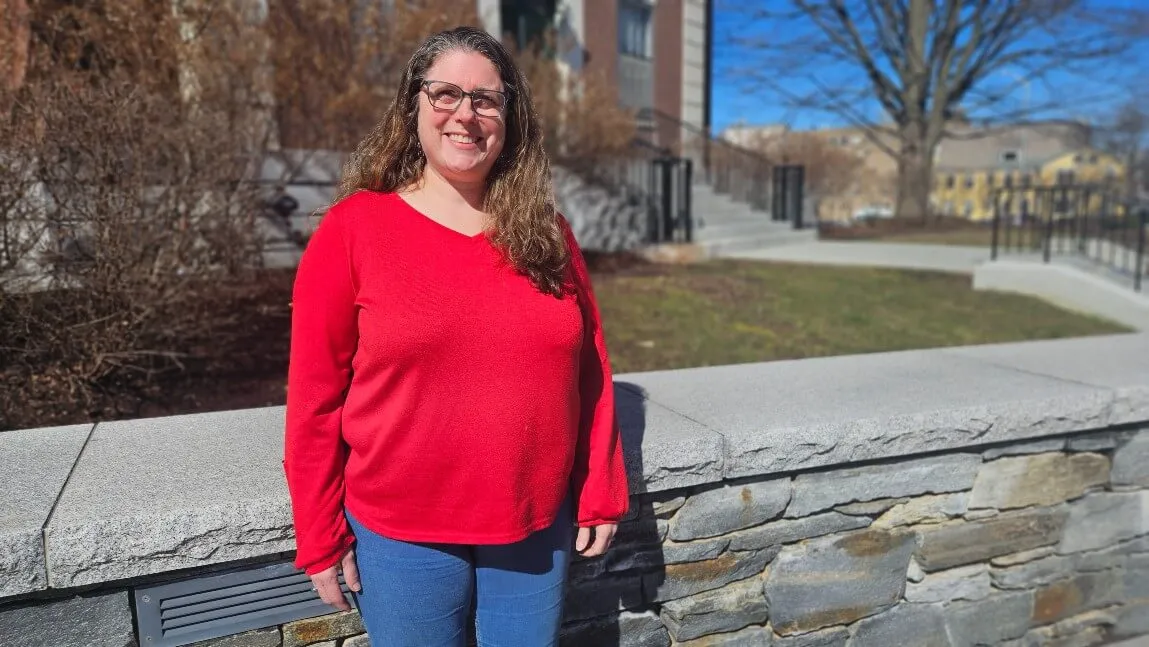From lab to farm, Abbey Dattilio has come full circle within the thriving research enterprise at the University of Vermont.
Dattilio began working as a laboratory technician in the Larner College of Medicine’s Department of Surgery in 2000. Twenty-four years later she can still frequently be found in labs on campus, but now it’s as a Monitoring and Compliance Specialist for UVM’s Research Protections Office. Dattilio oversees biohazard, animal, and controlled substance use, ensuring that all research follows federal- and university-level guidelines and policies.
“I collaborate with investigators to ensure they stay within compliance. It’s a working relationship, being able to go into these laboratories and understand their methods and procedures,” Dattilio said, adding that she knows most researchers by name if not by face. “That relationship makes my job more effective and their work easier.”
Dattilio’s roots in Larner feed her appreciation and respect for the work she now helps watch over.
“Medical research is a hugely important piece of what UVM does,” Dattilio said. “It’s meaningful to me, being able to work with such talented researchers and cutting-edge projects. A lot of the medical research is groundbreaking and will lead to life-changing discoveries for people down the road.”
Dattilio also gets a jolt of energy from having a front-row seat on the near-vertical upward trajectory of the university’s research enterprise. In her nearly quarter-century of employment at UVM, she has witnessed its transformation from a respected public institution into a bona fide national powerhouse in study, experimentation, and discovery.
“Research at UVM has really grown and changed in the time I’ve been here,” Dattilio said. “Our vice president of research, Kirk Dombrowski, has done amazing work with both our investigators and different funding agencies to bring a record number of research dollars into UVM. It has opened up a lot of avenues for research – opportunities for our students, faculty, and staff to do impactful work – and made us more competitive as a university.”
As one of a dozen recipients of this year’s President’s Our Common Ground Staff Award, Dattilio embodies the six values that shape what it means to be a part of UVM’s campus community. The first and most obvious is Innovation, as her position revolves around research and playing a role in discovering solutions to real-world challenges. She says several other OCG values also factor strongly into her work.
“Respect is an important part of how I like to conduct myself in dealing with the people I work with,” Dattilio said. “What makes our program successful in monitoring and compliance is that we work with people to try and help them be successful. Respect needs to inform the relationship we have; that’s how you ultimately end up with a good final result.”
Openness is another OCG value that strongly influences Dattilio’s work, in what she describes as “trying to break down barriers” with investigators.
“On the regulatory side, people feel that if they make a mistake, they won’t be comfortable approaching us and sharing that,” Dattilio said. “If I can stay centered in openness, it helps us develop a collaborative energy.”
Integrity is arguably the driving value within Dattilio’s work, particularly as it pertains to animals.
“We all have a huge responsibility to conduct research ethically,” she said.
Dattilio is a lifelong Vermonter who grew up in Essex and now lives there with her family on a small farm with ducks, chickens, and goats.
“I love Vermont because living here allows all these things,” she said.
Dattilio’s love of farming extends to her work, which includes regular visits to UVM’s CREAM Dairy Farm on Spear Street in Burlington as well as the university’s Morgan Horse Farm in Weybridge. Just as her earliest work in medicine at UVM was meaningful to her, her current role is fulfilling due to its impact.
“UVM’s agricultural research is especially important because it is mutually beneficial to animals and humans,” Dattilio said. “It is a really great learning opportunity for students and leads to research that benefits our farming communities in Vermont and beyond. Farming is not an easy lifestyle, especially nowadays, so this type of research can have a huge, positive impact.”
Whether on her family’s farm in Essex or one of UVM’s agricultural facilities that are open to the public, Dattilio sees parallels in the way these special settings, and their unique challenges and rewards, can inform and inspire.
“Teaching kids how to farm is an important aspect of introducing that way of life to future generations,” she said.
